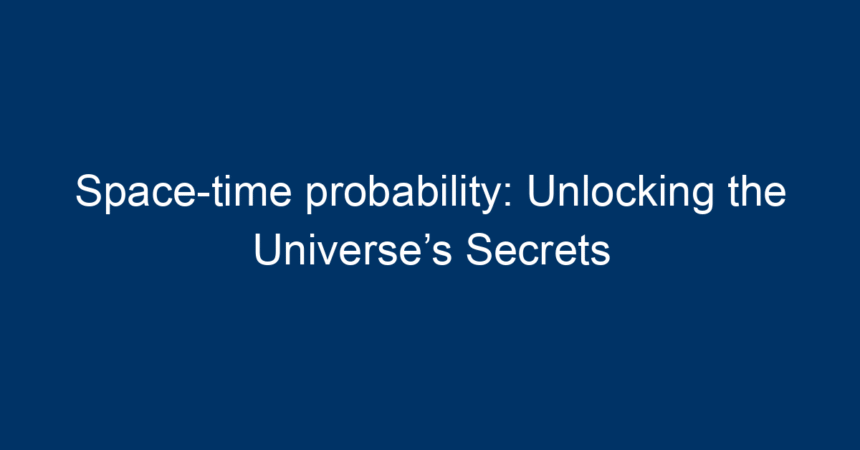Introduction
The universe is a grand tapestry woven from intricate threads of time and space. At the heart of this cosmic fabric lies a concept that challenges our understanding of reality: space-time probability. As physicists delve deeper into the realms of quantum mechanics and cosmology, they uncover profound implications about the nature of existence, causality, and the cosmos itself. In this article, we will explore the concept of space-time probability, its fundamental principles, and its potential to transform our understanding of the universe.
What is Space-Time Probability?
Defining the Concept
Space-time probability is a theoretical framework that combines the principles of space-time, as defined by Einstein’s theory of relativity, with the probabilistic nature of quantum mechanics. It suggests that not only does the universe exist in a four-dimensional fabric of space-time, but the events within it can be understood and predicted in terms of probabilities.
Quantum Mechanics and Probabilities
At the very foundation of quantum mechanics lies the idea that particles do not have definite positions and speeds until they are observed; instead, they exist in a state of probability. For instance, an electron can be in multiple places at once until measured, leading to a phenomenon known as wave function collapse. Combining this quantum uncertainty with the four dimensions of space-time opens new avenues for exploring how events unfold across the universe.
The Intersection of Space and Time
Understanding Space-Time
To grasp space-time probability, one must first understand space and time as dimensions that are interwoven. According to Einstein’s theory, space and time are not separate entities but are intricately linked in a four-dimensional continuum. This connection means that events are not isolated but can impact each other across time and space.
Non-Linear Time
Traditional views of time as linear are challenged by the concept of non-linear time, a feature often invoked in the realm of higher-dimensional theories. In this framework, the past, present, and future are interconnected. The implications of this interconnectivity suggest that future events might influence present probabilities, leading to revolutionary ideas about time travel and causality.
The Role of Probability in the Universe
Cosmic Events as Probabilistic
Every cosmic event—be it the birth of a star, a supernova explosion, or the merging of black holes—can be expressed in terms of probabilities. Understanding these probabilities allows scientists to make predictions about future cosmic events, enhancing our knowledge of astrophysics and cosmology.
The Influence of Quantum Fluctuations
Quantum fluctuations, inherent in the fabric of the universe, enable the emergence of various possibilities at every moment. These fluctuations contribute to the dynamic nature of space-time probability, filling the universe with potential outcomes that can manifest depending on various conditions.
Mathematical Frameworks of Space-Time Probability
Theoretical Models
To comprehend the intricacies of space-time probability, physicists utilize various mathematical models. One popular approach is through the Feynman path integral, which calculates the probability amplitude of a particle’s trajectory over all possible paths through space-time. This method emphasizes that every potential outcome contributes to the probability of an event, illuminating the nonlinear relationships between cause and effect.
Quantum Field Theory
Quantum Field Theory (QFT) is another area where space-time probability is fundamentally critical. In QFT, particles are viewed as excitations in underlying fields, and the interactions of these fields can be studied probabilistically. This approach helps unify quantum mechanics with special relativity, providing insights into how particles behave in varying space-time environments.
Implications for Cosmology
Dark Matter and Dark Energy
Space-time probability plays a crucial role in understanding dark matter and dark energy, two mysterious components of the universe. While dark matter influences gravitational effects without emitting light, dark energy seems to drive the universe’s accelerated expansion. By applying probabilistic methods, researchers can theorize about the distributions and interactions of these entities, potentially unlocking secrets of cosmic evolution.
Black Holes and Singularities
The study of black holes also significantly benefits from space-time probability. The event horizon—the boundary beyond which nothing can escape—introduces unique probabilistic elements to the nature of information and entropy. Understanding how matter behaves near these extreme environments may illuminate deeper truths about reality itself.
Real-World Applications
Technologies Inspired by Quantum Theory
The principles of space-time probability are not confined to theoretical physics. They influence real-world applications, especially in tech and information systems. Quantum computing, for instance, leverages the probabilistic nature of qubits, leading to faster processing speeds and enhanced computational capabilities.
Predictive Models for Natural Disasters
Space-time probability can also enhance predictive models in environmental science. By analyzing patterns and probabilities associated with natural phenomena, researchers can better anticipate disasters like earthquakes and tsunamis, potentially saving lives and minimizing damage.
Philosophical Implications
The Nature of Reality
The exploration of space-time probability raises profound philosophical questions about reality itself. If the universe operates on probabilities, does it challenge the notion of free will? Are our choices merely pathways among many possible futures? This questioning drives not just scientific inquiry but also deep philosophical debates.
The Multiverse Theory
One of the most intriguing implications of space-time probability is the multiverse theory, where every possible outcome exists in a vast collection of parallel universes. This notion radically reshapes our understanding of existence and our place within the cosmos, suggesting an infinite landscape of realities, each determined by different probabilities.
Conclusion
The fascinating world of space-time probability offers a spectacular lens through which to view the universe’s mysteries. By merging the realms of quantum mechanics with the fabric of space and time, we unlock insights that not only deepen our comprehension of cosmic processes but also refine our technological advancements.
As we continue to explore these concepts, we encourage you to ponder the implications of space-time probability in your own life. Whether in understanding the cosmos or appreciating the randomness of daily events, embracing the dance of possibilities enriches our perception of reality. Engage with this ever-evolving field of study, for in it lies the gateway to unlocking the universe’s secrets.
Actionable Insights
-
Stay Curious: Read books or articles about quantum mechanics and relativity to deepen your understanding of space-time probability.
-
Engage with Community: Participate in forums or groups that discuss physics and cosmology to exchange ideas and expand your knowledge.
-
Observe Patterns: Reflect on the probabilistic nature of everyday events and decisions, considering how they shape your life.
- Explore Technology: Investigate how advancements in quantum computing and related technology are influencing the future.
By embracing these insights, you can contribute to the ongoing dialogue about the universe, redefining our understanding of reality and existence itself.




